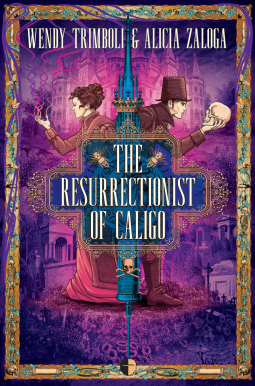The Resurrectionist of Caligo, by Wendy Trimboli and Alicia Zaloga (Angry
Robot)
In this fantastical
version of Victorian England, magic runs in the royal family, which jealously
guards the purity of its bloodline. One of the elite is young Princess Sibella,
currently in disgrace at a remote, austere country estate. Her magical
abilities include an inner glow and streaming ink from her fingers to create
not only letters on paper but tapestries in the air. Her childhood companion, Roger,
has also been expelled in disgrace and now ekes out a living as a “resurrectionist,”
procuring bodies for anatomical study at Caligo’s medical school while learning
everything he can about surgery. Their parting was rife with misunderstanding,
hurt, and anger.
Now danger stalks
the back streets of Caligo as “The Greyanchor Strangler” strikes again, just as
Sibella is summoned back home to be a marriage pawn in trade negotiations with
a neighboring kingdom. Eventually, of course, their paths cross again, Roger is
accused of being The Strangler, Sibella navigates the tortuous schemes of the
royal court, and secret plots and parentages are revealed. It’s as much a
comedy of manners and switched identities as a love story, a murder mystery,
and a tale of international intrigue as it is a fantasy. The characters are
fresh and lively, the plot twists many and delightful, and a delicious vein of
humor, while not taking itself too seriously, runs through the whole story.
Verdict: an entertaining read, quirky world-building, and fun characters mark
this as hopefully the beginning of wonderful series.










